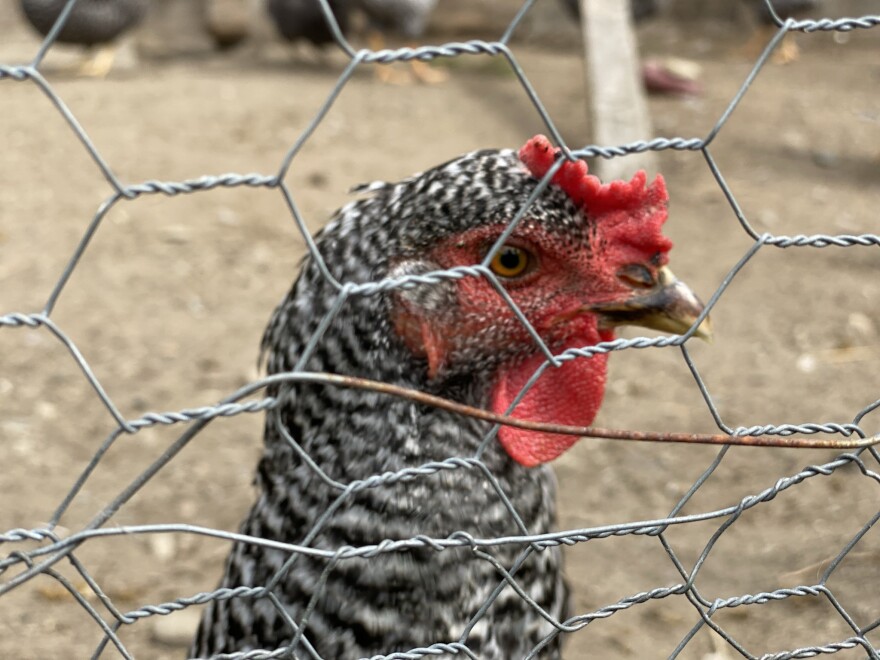EASTON, Pa. — Easton's resident "Chicken Lady," Carol Free, is on a mission to bring the birds back to Easton, letting locals raise their own fowls at home.
But Free is facing opposition, as the local city government has yet to push the issue to a vote.
- Easton's "Chicken Lady," Carol Free, is on a mission to allow her fellow citizens to keep backyard chickens
- Despite common misconceptions, experts agree keeping backyard chickens in a metropolitan area is perfectly safe with the proper care and precautions
- A meeting will be at 6 p.m. on May 23 at City Hall to address the issue
This week, Free, who runs the "Yes! Allow backyard Easton chickens" group on Facebook, will get a chance to approach local government officials and address why Eastonians should be allowed to raise backyard birds.
A meeting will be held at 6 p.m. Tuesday, May 23, at City Hall to address the issue.
Born in Easton, Free eventually made her way to California, during which time, she said, she was able to raise chickens in her yard by converting a coop-turned-playhouse back into a home for her birds.
Instantly, she said, those chicks became family.
"They were house chickens as much as they were outdoor chickens."Carol Free, Easton's 'Chicken Lady'
Free said she and her daughters named them all after famous and important women in history — Harriet Tubman, Florence Nightingale, Michelle Obama, Rosa Parks — and they spent their first few months of their lives both in and outside the family’s home and their little coop.
And those little ladies were just as affectionate to their new brood as a beloved puppy or kitten could be, she said.
“They were like, crawling on us; we'd be watching TV and have one under our chin while we're watching TV," Free said. "So they were house chickens as much as they were outdoor chickens."
Coming home to roost
When Free decided to make the move back to Easton a few years ago, she contacted the city government to ask about chickens, only to find out they were not permitted in the city.
Despite what she said are public misconceptions about chickens, Free soldiered on, working on establishing a pilot program that would gently introduce the concept to the city.
“I’m going to do a pilot program for a year or two, where you're allowed four chickens, you have to get a permit," she said. "You have to have a certain amount of space between your coop and your neighbor's yard. You have to have an enclosure.
“I already submitted a proposal to city council last July, and they said, ‘OK, well, we'll put it in a committee.’ Well, I never heard from the committee. Never heard a word.”
As it stands, the city government has opted to allow for today's meeting addressing backyard chickens.
Free is adamant about pressing the matter, emphasizing she takes it quite seriously — this isn’t a fly-by-night operation — and it will require dedication and education for all those who wish to partake.
"Part of my proposal is that people have to take a course ... on backyard chickens. We're not going to just let people jump into it if you don't know anything about it."Carol Free, Easton's "Chicken Lady"
“Part of my proposal is that people have to take a course, and either I'll lead the course or my friend may lead the course," Free said. "But you have to take the course on backyard chickens. We're not going to just let people jump into it if you don't know anything about it.”
Great eggs-peck-tations
In the meantime, Free said she has conducted more research and prepared to address questions or concerns from the city government for the meeting.
“It's mostly the health officer," she said. "That is the problem. The seven people on city council, I think I've swayed most of them. But the health officer doesn't want them, and the same thing’s going on in Bethlehem.”
That was a reference to a similar movement in Bethlehem where Health Director Wenrich said chickens may pose a potential risk for salmonella and avian influenza outbreaks.
Free noted those who care for backyard chickens should take precautions to prevent salmonella, but it does happen on occasion.
As for avian influenza, Free notes she is aware of it, though it is far more likely to affect chickens in factory farms, where cleanliness can be a serious issue. While backyard birds can be susceptible to it, it’s not as big a problem as many people make it out to be, she said.
But misconceptions about chickens are numerous, and it takes a proper "eggspert" to dispel those myths and misinterpretations.
Fowl misconceptions
Philip Klauer, associate teaching professor at Penn State University’s Department of Animal Science, has had plenty of experience with backyard chickens and all the issues — exaggerated or otherwise — that come along with them.
According to Klauer, the very first thought that should go through one’s mind when contemplating backyard chickens is: “Are they allowed in my area?”
After that comes the question of cost.
“First of all, getting yourself set up, even if you have an existing outbuilding that you can modify into temporary chicken house, you're still going to need equipment, you're still going to need the birds, you’re still going to need feed and those types of things," Klauer said.
"And those things aren't as inexpensive as people might think."
The common misconception of low-cost backyard chickens stems from the idea that the birds, their feed and other supplies can be bought at the same price paid for large-scale operations.
But when you’re only taking care of a few, there is a “pretty high premium,” as Klauer put it.
"The third thing that I find is most people today haven't had a lot of experience with raising animals, other than maybe a cat or dog, and chickens are really a 24/7 responsibility."Philip Klauer, associate teaching professor at Penn State University’s Department of Animal Science
And then there is the care to consider. Generally, people aren’t quite familiar with how to tend to chickens, and it can be more intensive than one would assume.
“The third thing that I find is most people today haven't had a lot of experience with raising animals, other than maybe a cat or dog, and chickens are really a 24/7 responsibility,” Klauer said.
“So if you're going to leave for a weekend, you're going to have to find someone who can sit your chickens and make sure to feed and water, collect the eggs and do the types of daily routines that these birds require.”
Flu, the coop
Ensuring a safe coop is a top priority, particularly for keeping the birds out of neighbors’ yards and providing them with a safe and warm place to spend when it gets cold.
On top of that, it’s integral to keep the coop clean, as chicken waste is high in uric acid, which can turn into ammonia when it gets wet, producing a powerful stench.
Excessive moisture combined with exposure to wind or breezes also can contribute to respiratory diseases in chickens, Klauer said.
"Highly pathogenic avian influenza is a disease that is spread by wild waterfowl and wild birds, typically. Most real small urban-type producers don't have a lot of trouble with it, because they don't have interface with waterfowl."Philip Klauer, associate teaching professor at Penn State University’s Department of Animal Science
Also, when it comes to chicken manure, you have to play it safe. While it’s possible to use for gardening, it must be composted to help reduce nitrogen, which can kill off plants quite easily otherwise.
One of the biggest concerns that comes up during talks about backyard birds is avian flu, but as it happens, it’s also one of the most misunderstood topics connected to chickens, Klauer said.
“Highly pathogenic avian influenza is a disease that is spread by wild waterfowl and wild birds typically," he said. "Most real small urban-type producers don't have a lot of trouble with it, because they don't have interface with waterfowl.”
With all that taken into consideration, you don’t have to be chicken about raising chickens in a metropolitan area, Klauer said.
It’s simply a matter of setting appropriate standards and ensuring owners are taking care of their flock.
“You're in downtown State College, the big metropolitan State College, you're allowed to have four chickens in your backyard,” Klauer said.
“Though the thing is, they went so far as to restrict that you can't compost the waste. You’ve got to clean the coops daily and double bag the waste in the municipal waste stream, which I didn't fully agree with.
"But that's the choice that they made as a municipality when they made the ordinance.”
Before taking the dive into backyard hen care, Klauer highly recommends seeking out resources, and possibly even taking a class on chicken care.
Make sure you don’t take on more than you can handle — remember, a chicken will usually lay about an egg a day, meaning a coop of four could produce around two dozen a week — and keep up the care, and chances are, you won’t have many issues.
Best of cluck!
Just last week, Stephen Nowroski, Easton’s director of planning and codes, received information about Free’s proposal, and leading up to Tuesday’s committee meeting, he and his crew have evaluated the idea.
“It looks like there is a proposal to allow up to four to six hens in residential areas, no roosters would be permitted," Nowroski said. "The proposal calls for a pilot program, and then a variety of standards for the chicken house — ventilation, access, cleaning, things like that.
"It provides for a permitting process, and training and ongoing inspections for compliance with the ordinance."
City council would be responsible for reviewing and adjusting the provided ordinance, and if it passes, it would go into effect 30 days later — potentially as early as late July, if all goes well.
"There's always concern with noise maintenance, but it depends. I know the proposal says no roosters, so that early morning call would not be an issue as proposed, but there's always concern of different types of bacteria and things like that."Stephen Nowroski, Easton's director of planning and codes
But before all that, Nowroski said Friday he and the health officer would need to carefully review the ordinance, and discuss potential hurdles before offering any advice on the matter.
“There's always concern with noise maintenance, but it depends,” Nowroski said. “I know the proposal says no roosters, so that early morning call would not be an issue as proposed, but there's always concern of different types of bacteria and things like that.
"So, we'd want to flesh out further things, potential setbacks from property lines for the chicken pens, how the chickens are essentially contained within a property, so it doesn't negatively affect any neighboring properties.”
Free has said she's perfectly fine with discussing the matter with city officials and reaching a conclusion that can satisfy everyone, allowing for backyard chickens in the city while respecting neighbors and health concerns.
After all, if you can keep chickens in New York City, of all places, why not Easton?
“It's not so much, ‘Why should we have chickens?’ as ‘Why not?'" Free said. "You know, back in the day, during World War II, they encouraged everybody in America to have their own backyard chickens.
“It's like part of American living.”


